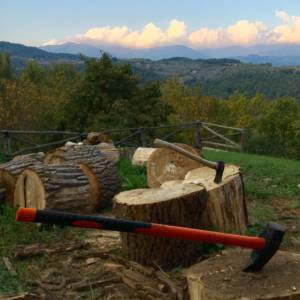The Works/Acacia notes
A day of thick fog and floating drizzle. Another trip to dentist. Up early to set the scene for the arrival of the builders. Such nice guys. The frost shattered patio tiles are gone, hammered back to a more or less firm footing for a terracotta finish. I would have been shattered after eight hours of pneumatic hammering and carting off the waste.
I was reading about the false acacia ( robinia pseudoacacia). It is actually the Appalachian native Black Locust tree. Brought to France in early 17c by a bloke called Robin - hence the ‘robinia’. To italy and Florence in early 18c. It is prized for its rapid growth and soil holding roots on unstable slopes, for the honey made from its copious blossom, for its hard wood for pit props, parquet and firewood. It is also a nitrogen fixing legume. And the blossom can be ate.
But it spreads rapidly by suckering, has brutal thorns on whippy wood when scrubby, crowds out other species, is largely toxic except to goats and when cut down explodes in regrowth and lateral suckering roots.
So there are pluses and minuses. It’s heavy straight grained wood splits easily - good for firewood but not for fence posts- and it has a pretty high calorific value when dry. I read it is grown commercially in Hungary and constitutes 20% of its forests.
Cutting ‘cascia’ ’ as it is called in Tuscany produces a counterproductive Hydra-like rejuvenation. The Italian Wikipedia entry suggests the best form of defence is leaving trees to mature and die out of their own accord. They also, from trees round here, have little defence against ivy.
Having spent part of yesterday cutting and burning new stump growth and suckers I can see the benefit of leaving trees to die out and the mature standards can look quite majestic in an exotic way.
I’ll report back in a year.
Doing a bit more scooting around on the internet I get the impression the black locust is a forest gardener/ permaculturist’s thing. This video seemed a fair overview from a US perspective https://smallfarms.cornell.edu/2018/01/black-locust/

Comments
Sign in or get an account to comment.


